| 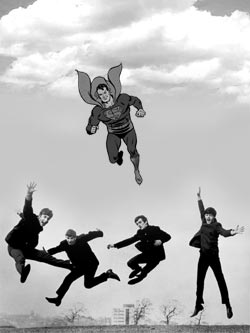 Superman
vs. Beatlemania Superman
vs. Beatlemania
By the 1960s, Superman had logged nearly
three decades as the protector of Metropolis, America and
indeed the Earth itself, fighting off countless invasions
of fascist armies, super-insects, malevolent space aliens
and giant robots. However, not even the Man of Might could
hold back the "British Invasion" of pop culture,
led by four cheeky lads from Liverpool.
Even staid old DC -- pegged by wags of the day as "Dad's
Comics" -- could
hardly fail to take note of Beatlemania. Traditionally, only
the safest, parent-approved celebrities made it into the pages
of DC books; the most "daring" comedians to show
up were Bob Hope and Jerry Lewis,
while Rock-and-Roll was represented not by Elvis Presley
but the cleanly scrubbed, family-friendly Pat Boone.
So when the Beatles stormed in, was it a
sign that DC was ready to appeal to a hipper crowd at last or
just a reflection of the "safe" all-ages appeal
of the Fab Four in their mop-topped, pre-psychedelic phase?
Some of the books the lads showed up in were the ones you might have expected,
like Girl's Romances and Heart Throbs, aimed
squarely at the same female audience who pinned up Beatle
photos in their bedrooms. Before long, however, the Fab Four also made
it into the pages of Metal Men, Teen Titans and,
of course, Superman's Pal Jimmy Olsen.
DC hedged their bets, as usual; the Beatles' name and their
images were invoked to spike sales, but inside the books,
Beatlemania was viewed through the lens of older eyes as
a kooky fad that would surely soon pass, but not before making fools
out of a lot of teenagers. In Jimmy Olsen #79 (Sept.
'64), for example, we get "The Red-Headed Beatle
of 1,000 B.C.", which starts with Jimmy -- already
well-established as DC's resident teenage lamebrain -- dancing
to a swingin' Mersey beat, complete with customized red Beatle
wig. If he's into the band, they've gotta be goofy.
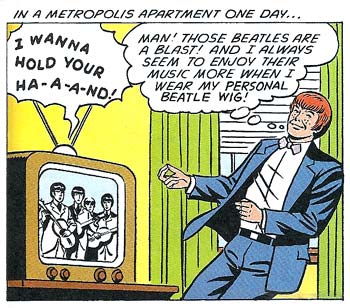
Kudos to artist George Papp, at least, for
including the left-handed bass-player (Paul, natch).
Despite the cover art, that's pretty much it for Beatle references
until the end of the story, when Jimmy -- temporarily transported to the Year 1000 BC -- slips his wig on a
young Samson to keep the strongman's hair
from being cut. Then, for good measure, Jimmy starts his own
musical craze when he plays (presumably Lennon/McCartney)
music on a shofar, of all things.
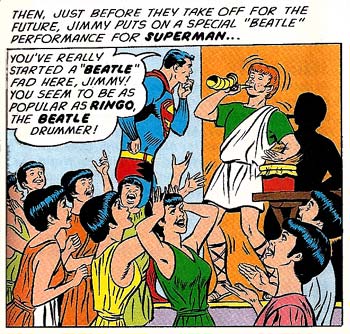
Note that Superman stays comfortably in his "father
figure" role, here; vaguely aware of the Beatles thanks
to the incongruously cowboy-sounding name of their drummer.
As we've seen before, as late as 1969, Superman is still under
the impression that Ringo is the real celebrity in the group,
dropping his name
like any other clueless square trying to sound hip.
Jimmy Olsen #87 (Sept. '65) brings us "Jimmy
Olsen, Rock-n-Roll Star," which unsubtly heaps
even more scorn on pop music in general and specifically the Beatles as
its exemplars. Visited by Bizarro-Jimmy Olsen,
who's in danger of being fired by Bizarro-Perry White
if he doesn't score a scoop, our Jimmy comes up with
a "brilliant" scheme; disguising himself as Bizarro-Jimmy,
he'll appear on the popular pop-music TV show Hulla-Bashin'
to perform a deliberately dreadful routine with the aim of getting thrown out of the
studio, thus creating a story worthy of the Bizarro newpaper's front
page (why the real Bizarro-Jimmy couldn't do the
same thing is beyond me).
With the cooperation of the show's producer, Jimmy dons
a bizarro mask and a Fab Four-like suit, topping it off with
a long-haired wig "so my hair will look like the Beatles!"
Looking on, the producer chuckles approvingly. Once in the
spotlight, Jimmy does his worst, belting out what I'll take to be
the Bizarro version of "Love Me Do:"
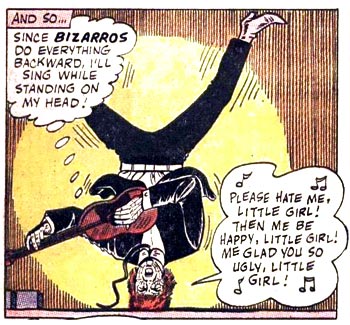
To his consternation, however, the teenage audience loves
the act (hey, the worse it sounds, the more teens like it,
right?). Putting on Bizarro masks of their own, they throw
down in a Bizarro Rave.
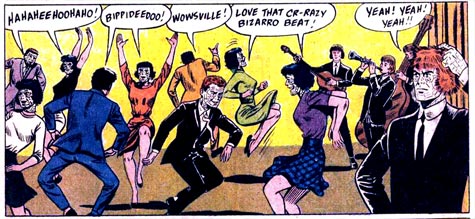
Jimmy Olsen #88 brings us "The Swinging Superman,"
and while the Beatle references are a bit more subtle this time, the band gets a shout-out
on the cover, where we're told Jimmy is "Bouncier
than the Beatles!" with his rocking new
hit, "The Krypton Crawl!" (Superman is shown dancing
to the beat and singing "Yah, Yah, Yah!")
Beyond the cover, the hijinks ensue when Jimmy goes to meet his stewardess girlfriend
Lucy Lane at Metropolis Airport, only to
be nearly trampled by an overexcited crowd of teenage girls,
there to greet the Beatle-esque Rick Rock and His
Rolling Romeos, in a scene reminiscent of the Fab
Four's 1964 arrival at JFK Airport.
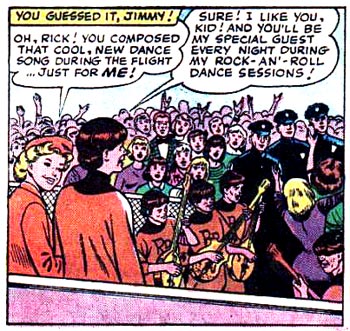
Miffed to find Rick Rock cozying up to Lucy, Jimmy decides
to fight fire with fire:
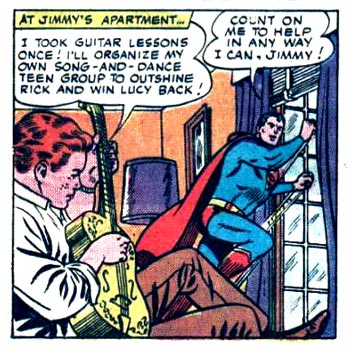
That's right, kids, a couple of guitar lessons and he's ready
for stardom. Just think what that boy could accomplish if
he put his mind to it. Of course it helps to have the most
powerful being in the known universe standing by to help you
land a gig. But hey, it's not like he's got anything better
to do, right?
Anyway, Jimmy forms his band ("Jimmy Olsen and
His Carrot-Top Cut-Ups"), and they all don red
wigs to resemble him. Superman recounts the story of a music-making
monster on Krypton that once entranced our hero's parents and many
other Kryptonians, nearly leading them, Pied-Piper style,
to their deaths. Using his power of super-recall, he writes
down the monster's tune on sheet music for Jimmy's band. When
they play it, Superman loses his mind and goes into a dance/march
across town.
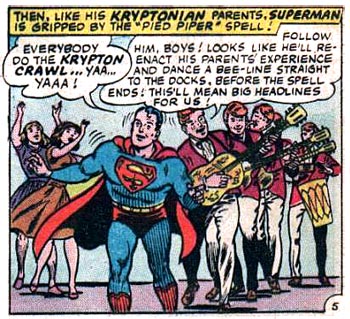
What follows is a series of unlikely occurrences "explained"
away in a head-scratching denouement, but if that surprises
you, you're obviously new to this site (Welcome!). The point
is that pop music is again portrayed as just so much foolish noise performed
by hacks and charlatans, and apparently now "potential malefactors"
as well.
All this dismissive mockery doesn't seem to have engendred any hard feelings, however, because
who should show up in the Beatles' first color film, Help!
but Jimmy Olsen himself! Early in the film, the lads are settling
into their gadget-laden apartment when an electric organ emerges
from the floor on a lift. Paul McCartney
takes to the keyboard, but instead of sheet music we see a row
of vintage DC Comics.
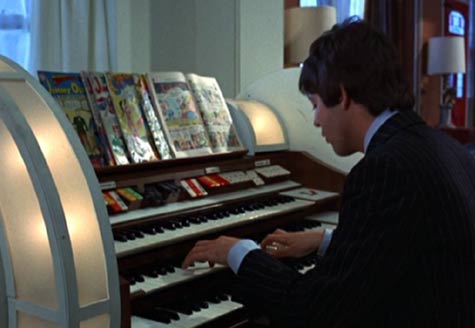
We can just make out bits of the Superman and Jimmy Olsen
mastheads, with one issue of Action Comics opened to a Supergirl
splash page.
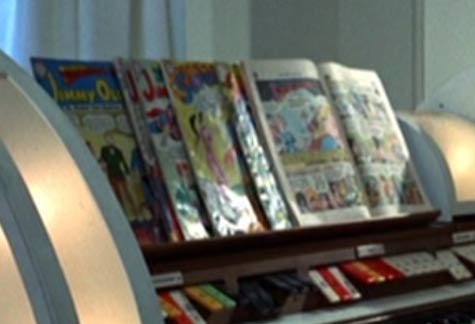
Naturally it didn't take long for an excited reader and Beatle
fan to mention this in a letter to Jimmy Olsen;
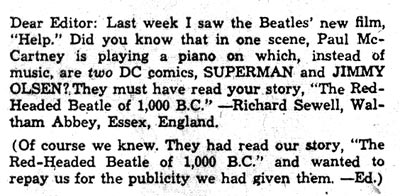
You'll have to forgive my skepticism here, but I kind of
doubt the Beatles included the comics in the film to "repay"
DC for publicity. As if they needed Jimmy Olsen to help get
them noticed! Can you imagine a kid in 1964 reading the comic
and thinking, "Hmm...who are these 'Beatles' Jimmy speaks
of? I'll have to look them up." And as noted, it's not
like they're treated very respectfully.
More likely the comics are just one more fleeting sight gag
in a film littered with them, the idea of director Dick Lester,
the prop master or some other crewmember. What makes it a
bit more interesting, though, is the publication dates of
the issues featured. A bit later in the scene, John
Lennon takes his place at the organ and we get a better
look at the books, allowing us to determine the specific issues:
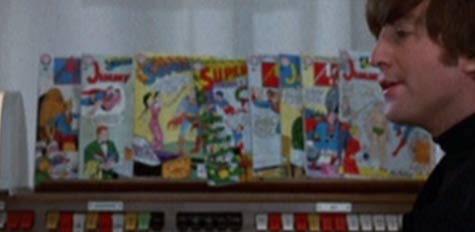
On display are Action Comics #304
(Sep. '63), 311 (Apr. 64) and 314
(Jul. '64), Superman #165 (Nov. '63) and 166 (Jan.
'64 ), and Superman's Pal Jimmy Olsen #65
(Dec. 62), 67 (Mar. '63) and 75 (Mar. '64).
The filming of Help! occurred from late February
to mid-April 1965. That means adding these comics to the scene
wasn't just a matter of going out to the newsstand and picking
up whatever was handy; all of these books had been around
for a while, some of them for nearly two years. So it's reasonable
to assume that someone somehow connected to the film collected
them, someone who obviously had a thing for Superman, as by
1965 we're already well into the era of arguably "hipper"
titles like the Flash, Green Lantern and the Justice
League of America, to say nothing of the glamorous and
newly trendy Marvel roster of titles.
A couple of years later, the Beatles would make another film,
the infamous Magical Mystery Tour, for broadcast
on the BBC. In the UK the six songs written for the film were
released in a special double-EP made to resemble a book, with
(among other things) illustrations of key scenes in the film.
One image showed the fantasies of a character called Buster
Bloodvessel, which included a rather familiar-looking
figure (not present in the film itself):
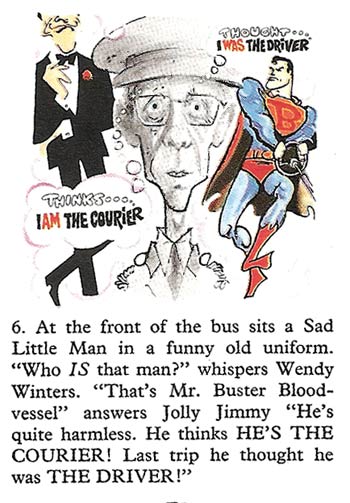
Of course the ideal form of recognition from the Fab Four
would be a mention in one of their songs, but this is something
Superman never gets. When a superhero does finally show up
in Beatle lyrics, it's Superman's arch rival Captain
Marvel in Lennon's "The Continuing Story
of Bungalow Bill." Not until his 70s Wings period
does McCartney give his one shout out to the genre with "Magneto
and Titanium Man," name-checking
two Marvel villains in the title (and a third in the lyrics:
the Crimson Dynamo).
Maybe it was their revenge for those Weisinger-era stories
poking fun at their look and sound, but when it was time for
the Beatles to return the "publicity," Marvel and
Fawcett got all the love.
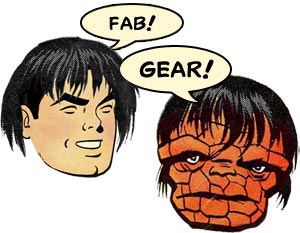
|

 Superman
vs. Beatlemania
Superman
vs. Beatlemania











